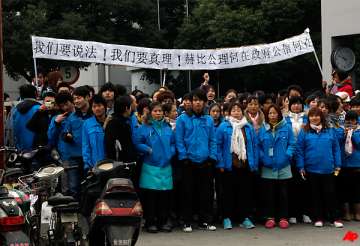Workers Mass At Shanghai Factory In Latest Unrest
Shanghai, Dec 2: China is seeing a fresh upsurge in labor unrest as slowing demand for its exports in Europe and the U.S. hits manufacturers already juggling tight credit and weakening growth at home.In one

Shanghai, Dec 2: China is seeing a fresh upsurge in labor unrest as slowing demand for its exports in Europe and the U.S. hits manufacturers already juggling tight credit and weakening growth at home.
In one of the latest labor actions by restive young Chinese workers, hundreds of laid-off factory staff gathered Friday outside a Shanghai factory of a Singaporean supplier to major consumer electronics companies such as Motorola and HP.
Some workers said they were beaten by police earlier during the protests—one showed bruises on his forehead.
Reports of recent strikes at factories and other major employers, especially in southern China, reflect increasing pressure on Chinese manufacturers already grappling with surging costs for labor and materials. The country's manufacturing contracted in November for the first time in nearly three years, according to a survey released Thursday.
This week, Beijing began reversing its two-year effort to cool the world's second-biggest economy as worries that slowdowns in factory production and property overshadow longer-term efforts to tame inflation and temper China's excessive reliance on investment as a driver of growth.
In recent months, troubles with financing have stalked both the construction and manufacturing sectors, as factories and even the powerful Railway Ministry ran short of cash. Migrant workers often ended up with delayed or unpaid wages.
The 300-400 workers at the factory gate of Hi-P International in the eastern industrial suburbs of Shanghai said it was their third day of protesting over mass layoffs due to the company's decision to relocate some manufacturing.
They said they were seeking more information, and improved terms for themselves.
“We all work for this company, and now if the company is going to move, they owe us an explanation. So we are waiting for a solution,” said Chang Yan, a woman in her mid-20s who like most of the others was wearing a blue factory jacket embossed with a red Hi-P logo.
The workers, who said they were from various regions outside Shanghai, also accused the factory of violating labor standards.
“Sometimes, they ask us to work 18 or 19 hours in a day. Sometimes the overtime is even longer than a normal 8-hour work day,” said Tao Yong, a worker in his mid-30s.
Police in vans and unmarked cars watched but did not intervene.
Company officials contacted by phone in Shanghai and Singapore refused comment on the protest. Shanghai city government and police also did not immediately respond to inquiries about the strike or the workers' claims of injuries from scuffles with police.
Reflecting the tougher times for manufacturers, Hi-P International's net profit margin plunged 80 percent from a year earlier in third quarter to 2.1 percent from 11.6 percent—mainly due to higher costs. Net profit in July-September fell 42 percent to 6.5 million Singapore dollars ($5.1 million) from a year earlier, according to its latest financial report.
The company, founded in 1980 as a tooling factory, said its third-quarter revenue rose 34 percent, but so did costs for materials and taxes.
The New York-based group China Labor Watch said Hi-P was shifting some of its production to the nearby city of Suzhou and had not paid the legally required amount of compensation to workers, who were laid off without notice.
According to its website, Hi-P International is a contract manufacturer for the wireless telecommunications, consumer electronics and computing and automotive industries, with two-dozen factories and about 18,000 employees.
Hi-P has factories in five other Chinese cities besides Shanghai and Suzhou. Motorola and other major electronics companies are among its customers.